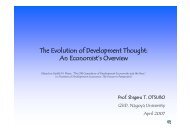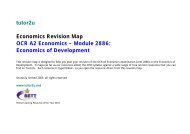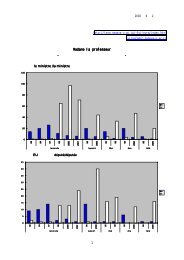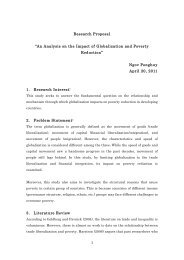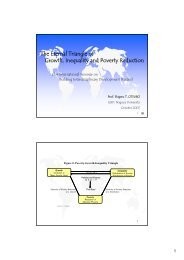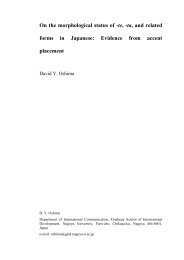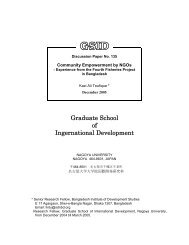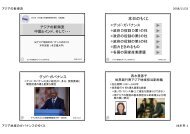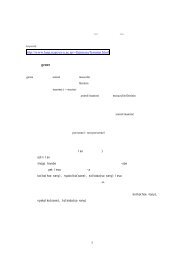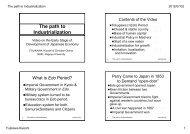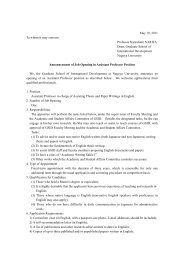Report
Report
Report
Create successful ePaper yourself
Turn your PDF publications into a flip-book with our unique Google optimized e-Paper software.
162 QUANTIFICATION OF BENEFITS FROM ECONOMIC COOPERATION IN SOUTH ASIA<br />
• However with regard to nursing and dental, there<br />
is no information on whether other SAARC countries<br />
have recognised degrees from each other.<br />
• There are no explicit requirements for citizenship<br />
or residency to register with the relevant authorities<br />
for practicing the profession of medicine or<br />
dentistry in the relevant SAARC member.<br />
CONCLUSIONS AND RECOMMENDATIONS<br />
Overview<br />
The inclusion of services within the SAFTA framework<br />
presents several challenges and opportunities for the<br />
SAARC countries. Such an inclusion holds potential<br />
not just for ensuring greater intra-SAARC trade, but<br />
also holds the potential of raising the levels of<br />
competitiveness in the South Asian region as a whole.<br />
It has been estimated that the availability of services<br />
(especially tourism, health, education, and labour)<br />
within the SAARC region will help to attract consumers<br />
from other parts of the world, and that an advanced<br />
services infrastructure within the region will boost the<br />
regions’ share in global services trade. 60 For facilitating<br />
this, several developments to liberalise both within each<br />
country, and at the regional level, will be necessary.<br />
With respect to health services, as already discussed,<br />
there are very few regulatory constraints in the SAARC<br />
countries in respect of investments in the health sector.<br />
The regulatory framework in each country is also<br />
conducive to arrangements for recognition of foreign<br />
medical and dental qualifications. There are no<br />
regulatory constraints on movement of patients from<br />
one country to another for treatment. However, there<br />
are several other issues pertaining to supply of services<br />
under each mode, which need to be addressed as part<br />
of the negotiations. These are summarised below.<br />
Recommendation 1: Investment Related<br />
Aspects Affecting Health Services, i.e.<br />
Mode 3 Service Delivery<br />
• Address upgrading commitments to autonomous<br />
levels: One of the aspects that comes out from the<br />
discussions in this chapter is that while none of the<br />
SAARC countries have committed Mode 3 in<br />
‘hospital services’ as an area for complete liberalisation<br />
under the GATS framework, each of the<br />
countries has achieved significant autonomous<br />
liberalisation in this Mode, and there are practically<br />
no regulatory impediments to Mode 3 in the<br />
regulatory framework of these countries. Only<br />
Maldives and Bhutan require specific government<br />
approval for joint ventures in the hospital<br />
sector. In all the other countries, 100% FDI is<br />
allowed.<br />
As part of the SAARC negotiations, the upgrading<br />
of the GATS commitments to the autonomous<br />
levels achieved in the member countries, should,<br />
therefore, be an aspect for discussion.<br />
• Address Investment-related operational constraints<br />
at national and regional levels: Operational<br />
constraints to investment need to be dealt with at<br />
the national level as a matter of legal and<br />
institutional reform. While this process needs to<br />
be undertaken at both the national and regional<br />
levels, investment related provisions investment<br />
related provisions under SAFTA could provide<br />
certain obligatory provisions offering special<br />
protection for foreign investors.<br />
• Constitution of a working group to address FDI<br />
related barriers: The SAFTA currently does not<br />
envisage a chapter on Investment. It however mandates<br />
the SAFTA members to consider removing<br />
barriers to intra-SAARC investments. 61 Constraints<br />
to FDI as identified above could therefore be studied<br />
and attempt to be addressed under a joint working<br />
group of the SAARC members.<br />
Recommendation 2: MRAs for Recognition<br />
of Medical and Dental Degrees between<br />
SAARC Members<br />
There are a number of similarities in the regulatory<br />
frameworks for recognition of qualifications and<br />
licensing of professionals in medicine, dentistry and<br />
nursing. Reciprocal arrangements for recognition of<br />
medical degrees exist among India, Bangladesh, Sri<br />
Lanka, Nepal and Pakistan. With respect to Maldives<br />
and Bhutan, these countries seem to recognise medical<br />
degrees at least from India and Sri Lanka. Internship<br />
and other work experience requirements for<br />
qualification are also similar in all the countries. There<br />
are no constraints in terms of citizenship and residency<br />
requirements in the regulatory framework.<br />
60<br />
See, Shivraj Bhatt, “Services under SAFTA: How to make it work for South Asia?” Nepalnews.com, September 6, 2006,<br />
available at http://www.bilaterals.org/article.php3?id_article=5780<br />
61<br />
Article 8, Agreement on SAFTA.




